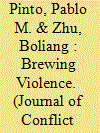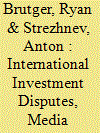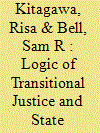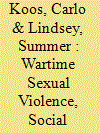|
|
|
Sort Order |
|
|
|
Items / Page
|
|
|
|
|
|
|
| Srl | Item |
| 1 |
ID:
186335


|
|
|
|
|
| Summary/Abstract |
Two prominent features in current world affairs are the unprecedented level of global economic integration and the growing incidence of intrastate violence. We develop and test a novel argument linking global integration through foreign investment to intrastate armed conflict. The presence of multinational corporations in developing countries can cause market concentration, resulting in high rents. Disputes between governments and would-be challengers over the appropriation of these rents are likely to turn violent, increasing the incidence of armed conflict. State capacity mitigates this positive association between foreign investment and intrastate war. Strong states have the capacity to deter rebellions, address citizens’ demands through institutionalized mechanisms, and credibly commit to the peaceful resolution of conflicts. Using data from developing countries for over four decades and addressing potential endogeneity and selection biases, we find strong support for our hypotheses. Our findings have important implications for understanding the link between economic interdependence and conflict.
|
|
|
|
|
|
|
|
|
|
|
|
|
|
|
|
| 2 |
ID:
186333


|
|
|
|
|
| Summary/Abstract |
Why do some states possess more advanced military technologies than others? Our study explores the vertical proliferation of land-attack cruise missiles (LACMs), seeking to understand which demand- and supply-side factors best explain why some countries acquire more sophisticated LACMs. We theorize that states’ security environments, regime types, possession of related strategic technologies, and membership in the Missile Technology Control Regime (MTCR) influence the possession of more sophisticated cruise missiles. Our analysis employs a unique new global dataset with granular data on every LACM national militaries have deployed. We use this dataset to evaluate the proliferation of LACMs across the international system from 1991–2015. Using a selection model that first controls for the horizontal proliferation of LACMs, we find that insecurity, scientific and technical expertise from related technologies, the possession of highly authoritarian and highly democratic regimes, and MTCR membership all have positive effects on the sophistication of LACM-possessors’ arsenals.
|
|
|
|
|
|
|
|
|
|
|
|
|
|
|
|
| 3 |
ID:
186337


|
|
|
|
|
| Summary/Abstract |
“Ending impunity” is often heralded as the key mechanism for stopping rape in war. Yet, little systematic evidence or analyses exist of the relationship between impunity (or lack thereof) and sexual violence. We argue that amnesties signal impunity and permissiveness for sexual violence, which can perpetuate and instigate more sexual violence by rebels. Trials, on the other hand, signal a nonzero probability of punishment, which could have a deterrent effect. Studying all intrastate armed conflicts in the period 1989–2011, we find in line with the impunity signal that amnesties are associated with sexual violence by rebels, but we are not able to demonstrate a deterrent effect of trials. While the study prevents us from conclusively saying that ending impunity would be an effective policy tool to stop sexual violence in war, the association between amnesties and subsequent sexual violence is a testament to the perils of impunity.
|
|
|
|
|
|
|
|
|
|
|
|
|
|
|
|
| 4 |
ID:
186334


|
|
|
|
|
| Summary/Abstract |
This paper puts forth a theory explaining domestic backlash against international investment law by connecting media coverage—specifically the bias in the news media’s selection of international disputes—to public opinion formation towards international agreements. To test our theory, we examine both the content and effects of the media’s reporting on international disputes, focusing on the increasingly controversial form known as investor-state dispute settlement (ISDS). We find that newspaper outlets in both the United States and Canada have a bias in favor of covering disputes filed against their home country as opposed to those filed by home country firms. Using two national survey experiments fielded in the United States and Canada, we further find that the bias in news story selection has a strong negative effect on attitudes towards ISDS and related agreements, especially among highly nationalistic individuals.
|
|
|
|
|
|
|
|
|
|
|
|
|
|
|
|
| 5 |
ID:
186338


|
|
|
|
|
| Summary/Abstract |
Human rights prosecutions addressing wartime crimes are often credited with deterring future rights abuses, but routinely occur alongside state repression. This article develops a theory of how such prosecutions generate uneven effects across domestic human rights practice by making some repression tactics costlier than others—in the public visibility of the abuse or ease of attribution to leadership—or by directly substituting certain tactics. We test the implications with a multivariate probit analysis of novel prosecution data in contemporary conflict and post-conflict settings. Trials significantly reduce reliance on political imprisonment and extrajudicial killings, relatively visible abuses, whereas gains for less visible physical integrity rights are limited. Further, trials themselves are sometimes deployed as a direct substitute for political imprisonment. The findings reveal how human rights prosecutions themselves can be part of a government’s repressive toolkit, with implications for the study of transitional justice and the judicialization of repression.
|
|
|
|
|
|
|
|
|
|
|
|
|
|
|
|
| 6 |
ID:
186339


|
|
|
|
|
| Summary/Abstract |
The current research reveals that the pursuit of peace entails an inherent paradox. The urgent need to save lives and alleviate human suffering necessitates swift solutions to the problem of intergroup conflict. However, because the human mind associates peace with longer time horizons, people anticipate peace more when considering the distant rather than the near future. Six experiments demonstrate a robust and large effect whereby thinking about the distant future promotes the prospects of peace compared to thinking about the near future. These experiments also provide evidence for the role that construal fit, that is, the tendency to match high temporal distance with abstractness, plays in this effect. We discuss implications for shorter-term and longer-term peace interventions.
|
|
|
|
|
|
|
|
|
|
|
|
|
|
|
|
| 7 |
ID:
186336


|
|
|
|
|
| Summary/Abstract |
Sexual violence by armed groups is common in civil wars. Qualitative studies have shown that victims and their families experience social stigmatization. Stigmatization is viewed as a central mechanism to social exclusion and disintegration impeding post-conflict social, political, and economic recovery. We provide new theory on the social conditions under which rape-related stigma intensifies and decreases. Drawing on an original population-based survey in eastern Democratic Republic of Congo, we find that victims and their families experience higher levels of stigma compared to unaffected families and these effects are dependent on community attitudes and norms. Furthermore, we find that humanitarian support interventions designed to address the social nature of stigma can reduce stigma. Our article significantly expands prior knowledge on a central mechanism in post-conflict recovery by providing a refined theory on wartime rape-related stigma and the role of humanitarian aid in mitigating negative effects based on representative data.
|
|
|
|
|
|
|
|
|
|
|
|
|
|
|
|
|
|
|
|
|